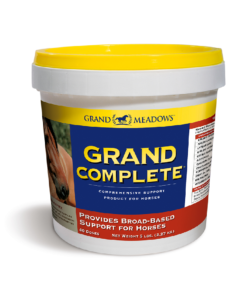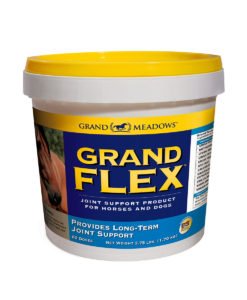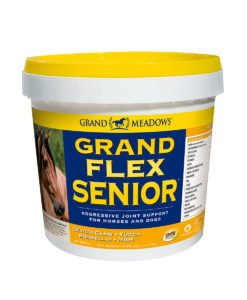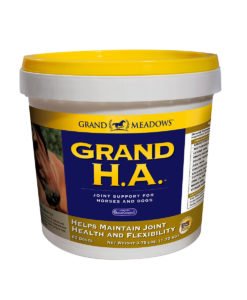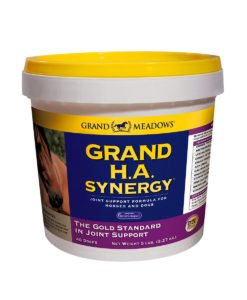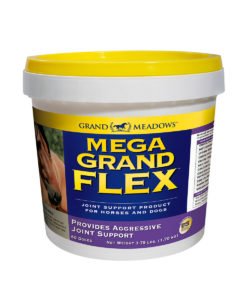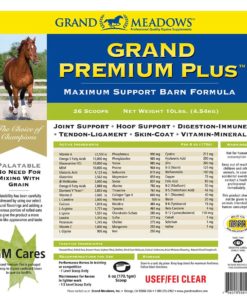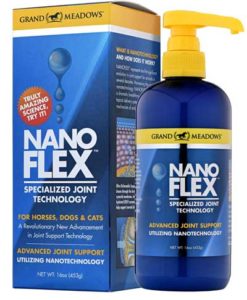Unmatched Quality in Horse Joint Supplements
At Grand Meadows, we understand the critical role of horse joint support in maintaining the health and mobility of your equine partners. Whether they are high-performance athletes or beloved companions in their golden years, our horse joint supplements are meticulously formulated to provide comprehensive care for their joints.
Our products, such as Grand Flex, Grand H.A., and Grand H.A. Synergy, are enriched with ingredients like Hyaluronic Acid, which is renowned for promoting joint health. These components work synergistically to enhance joint function and alleviate discomfort caused by conditions such as arthritis and other degenerative issues.
Hear from Our Happy Customers
The effectiveness of our supplements is reflected in the many five-star reviews from satisfied customers who have seen tangible improvements in their horses’ joint health and overall mobility.
Explore our range of horse joint supplements and discover why so many horse owners trust Grand Meadows for their horses’ joint care needs. Shop now and give your horse the support it deserves for a healthier, more active life.
All Products
All Products
All Products
All Products
All Products
All Products
Frequently Asked Questions
What is a scientifically proven joint supplement for horses?
Methylsulfonylmethane (MSM) is crucial for joint support as it is an essential component of cartilage, glycosaminoglycans, and other connective tissues. Animal studies indicate that MSM can contribute to maintaining horses' healthy coats, skin, and hoof quality.
What can I give my horse for stiff joints?
Glucosamine and chondroitin are among the most common ingredients in horse joint supplements. These ingredients work together to support horses' joint cartilage health and reduce inflammation. Hyaluronic acid is another principal ingredient in these supplements, aiding joint lubrication and pain prevention.
How to choose a joint supplement for horses?
When choosing a joint health supplement for your horse, several important factors should be considered:
The life stage of your horse: The prevalence of connective tissue deterioration is higher in senior and racing horses. Supplementing for joint health early and throughout maturity can help prevent damage from the workload.
Current joint health status: The specific needs of your horse will determine which supplement may be most beneficial. While most supplements can support healthy joint function, it’s crucial to assess any potential drug interactions if your horse is on medications or has unique needs.
Bioavailability of a supplement: This refers to the amount of a nutrient absorbed in the digestive tract and utilized by the body. A supplement that is not bioavailable will not reach its therapeutic target, regardless of the dosage.
Research quality and efficacy: The depth and conclusiveness of studies backing a supplement can help determine its superiority. However, since every horse is different, a supplement effective for one horse may not work for another.
These considerations can help you navigate the marketplace of equine joint health supplements, ensuring you choose the best option for your horse’s specific needs.
When to start a horse on joint supplements?
Joint supplements often include ingredients like glucosamine, chondroitin sulfate, and hyaluronic acid, which are used to maintain healthy joints and prevent future issues. Therefore, the ideal time to start your horse on a joint supplement is before any signs of joint pain or discomfort appear. However, it's never too late for senior horses to benefit from these supplements. If your older horse is showing signs of discomfort, a joint supplement can help provide the necessary nutrients to support their aging joints and alleviate stress.
What causes joint inflammation in horses?
Joint swelling or inflammation in horses is common and can be caused by various factors, depending on severity. Some causes can be potentially career-ending for competitive horses if not treated immediately. Immediate veterinary care is essential if joint swelling is accompanied by severe or sudden lameness. Even in mild or no lameness cases, prompt veterinary attention is crucial to rule out underlying issues and ensure the joint's long-term health. Potential causes of joint swelling include traumatic injury, septic arthritis, osteoarthritis, injury to the joint bursa, subchondral cysts, osteochondritis dissecans, and bone spavin (distal hock) arthritis.

